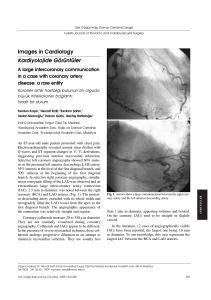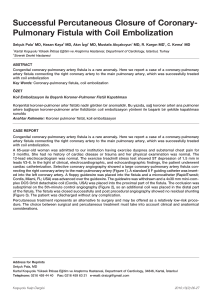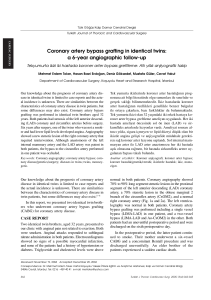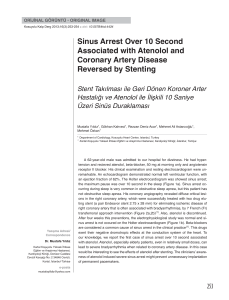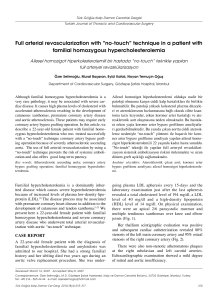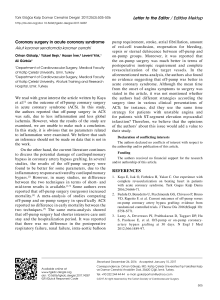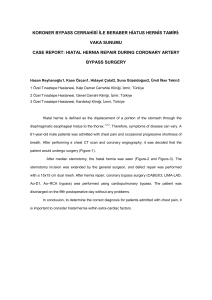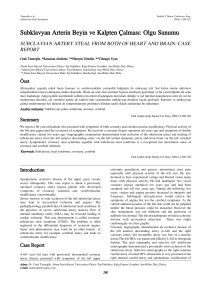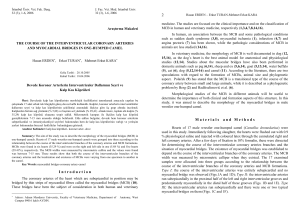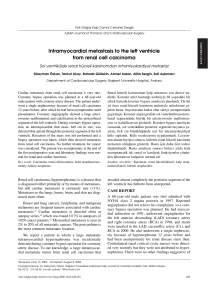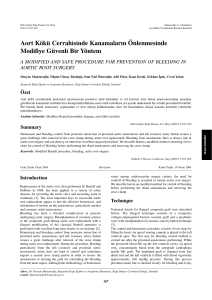Emergency surgical revascularization for catheter
advertisement
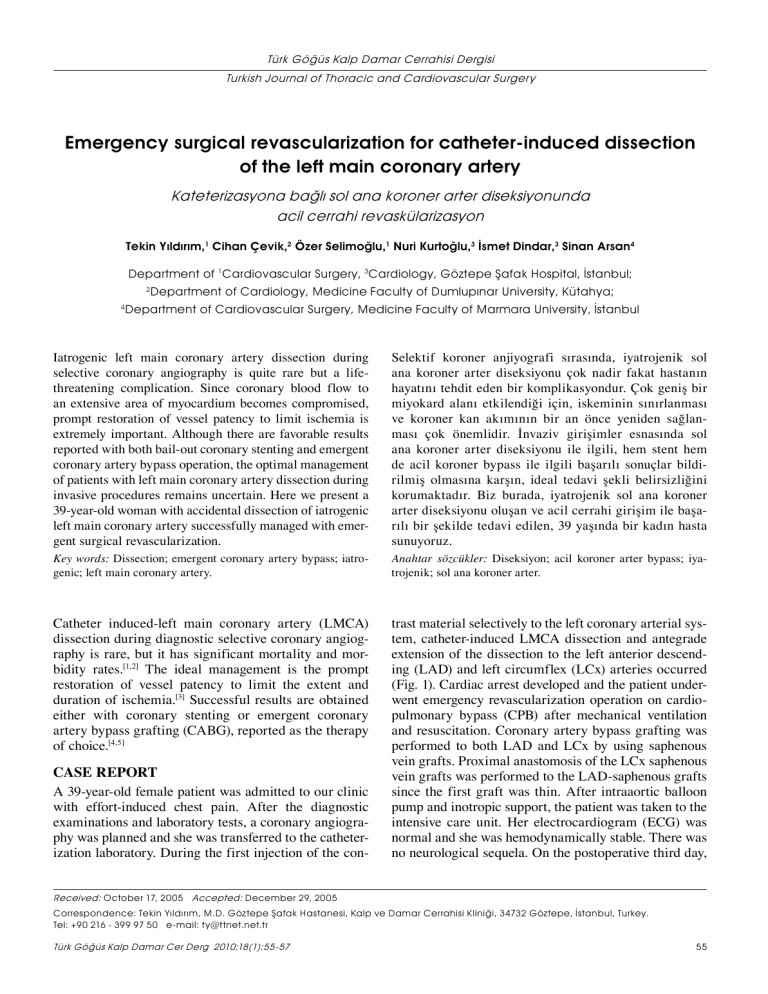
Türk Göğüs Kalp Damar Cerrahisi Dergisi Turkish Journal of Thoracic and Cardiovascular Surgery Emergency surgical revascularization for catheter-induced dissection of the left main coronary artery Kateterizasyona bağlı sol ana koroner arter diseksiyonunda acil cerrahi revaskülarizasyon Tekin Yıldırım,1 Cihan Çevik,2 Özer Selimoğlu,1 Nuri Kurtoğlu,3 İsmet Dindar,3 Sinan Arsan4 Department of 1Cardiovascular Surgery, 3Cardiology, Göztepe Şafak Hospital, İstanbul; 2 4 Department of Cardiology, Medicine Faculty of Dumlupınar University, Kütahya; Department of Cardiovascular Surgery, Medicine Faculty of Marmara University, İstanbul Iatrogenic left main coronary artery dissection during selective coronary angiography is quite rare but a lifethreatening complication. Since coronary blood flow to an extensive area of myocardium becomes compromised, prompt restoration of vessel patency to limit ischemia is extremely important. Although there are favorable results reported with both bail-out coronary stenting and emergent coronary artery bypass operation, the optimal management of patients with left main coronary artery dissection during invasive procedures remains uncertain. Here we present a 39-year-old woman with accidental dissection of iatrogenic left main coronary artery successfully managed with emergent surgical revascularization. Selektif koroner anjiyografi sırasında, iyatrojenik sol ana koroner arter diseksiyonu çok nadir fakat hastanın hayatını tehdit eden bir komplikasyondur. Çok geniş bir miyokard alanı etkilendiği için, iskeminin sınırlanması ve koroner kan akımının bir an önce yeniden sağlanması çok önemlidir. İnvaziv girişimler esnasında sol ana koroner arter diseksiyonu ile ilgili, hem stent hem de acil koroner bypass ile ilgili başarılı sonuçlar bildirilmiş olmasına karşın, ideal tedavi şekli belirsizliğini korumaktadır. Biz burada, iyatrojenik sol ana koroner arter diseksiyonu oluşan ve acil cerrahi girişim ile başarılı bir şekilde tedavi edilen, 39 yaşında bir kadın hasta sunuyoruz. Key words: Dissection; emergent coronary artery bypass; iatrogenic; left main coronary artery. Anah­tar söz­cük­ler: Diseksiyon; acil koroner arter bypass; iyatrojenik; sol ana koroner arter. Catheter induced-left main coronary artery (LMCA) dissection during diagnostic selective coronary angiography is rare, but it has significant mortality and morbidity rates.[1,2] The ideal management is the prompt restoration of vessel patency to limit the extent and duration of ischemia.[3] Successful results are obtained either with coronary stenting or emergent coronary artery bypass grafting (CABG), reported as the therapy of choice.[4,5] trast material selectively to the left coronary arterial system, catheter-induced LMCA dissection and antegrade extension of the dissection to the left anterior descending (LAD) and left circumflex (LCx) arteries occurred (Fig. 1). Cardiac arrest developed and the patient underwent emergency revascularization operation on cardiopulmonary bypass (CPB) after mechanical ventilation and resuscitation. Coronary artery bypass grafting was performed to both LAD and LCx by using saphenous vein grafts. Proximal anastomosis of the LCx saphenous vein grafts was performed to the LAD-saphenous grafts since the first graft was thin. After intraaortic balloon pump and inotropic support, the patient was taken to the intensive care unit. Her electrocardiogram (ECG) was normal and she was hemodynamically stable. There was no neurological sequela. On the postoperative third day, CASE REPORT A 39-year-old female patient was admitted to our clinic with effort-induced chest pain. After the diagnostic examinations and laboratory tests, a coronary angiography was planned and she was transferred to the catheterization laboratory. During the first injection of the conReceived: October 17, 2005 Accepted: December 29, 2005 Correspondence: Tekin Yıldırım, M.D. Göztepe Şafak Hastanesi, Kalp ve Damar Cerrahisi Kliniği, 34732 Göztepe, İstanbul, Turkey. Tel: +90 216 - 399 97 50 e-mail: ty@ttnet.net.tr Türk Göğüs Kalp Damar Cer Derg 2010;18(1):55-57 55 Yıldırım et al. Emergency surgical revascularization for catheter-induced dissection of the left main coronary artery a control coronary angiography was performed in order to detect the patencies of right coronary artery (RCA) and saphenous bypass grafts. The right coronary artery was angiographically normal and the bypass grafts were patent (Fig. 2). The patient was discharged on the postoperative sixth day and she is doing-well without any symptoms on the postoperative fourth year by now. DISCUSSION Guide-wire or catheter-induced iatrogenic LMCA dissection is a rare but devastating complication during diagnostic selective coronary angiography or interventional procedures. In a large series of more than 40.000 procedures,[2] it has been documented that the mortality rate is 0.071%, and 67% of this mortality was resulting from left main coronary artery dissection. There has been no change in the incidence over the nine-year recruitment period of this study. It is clear that even with delicate techniques, this dramatic complication may develop in a small number of patients. Prompt diagnosis and emergent management is crucial. There are reports of successful interventions in the literature either with non-surgical (coronary-stenting) or surgical myocardial revascularization to this complication. In our patient, cardiac arrest developed and she had to undergo emergent operation under resuscitation. Coronary stenting could have been the alternative management strategy if she had responded to resuscitation. Emergent CABG has been a life-saving method for this patient. The optimal management for life-threatening LMCA dissection depends on the patients’ clinical situation and the retrograde extension of the dissection to the ascending aorta. of 10 patients and there was no mortality reported. In another study of 112.921 procedures,[5] urgent CABG was attempted in 42 patients with main coronary artery disease or dissection. Thirty-one of the patients (75%) were alive at one month. In this study, the emergency CABG was recommended for the patients who develop complications during cardiac catheterization. Gür et al.[6] reported in their study about a catheter-induced RCA dissection treated by emergent off-pump CABG. In another study,[7] LMCA dissections with limited retrograde aortic involvement were successfully managed with stenting of the coronary dissection entry point. Also in this study, the overall incidence of coronary artery-aortic dissections was 0.02%, and surgical intervention was recommended to the dissections extending up the aorta >40 mm from the coronary ostium. In an autopsy study of Curtis et al.[8] it has been hypothesized that an angulated LMCA (acute angle take off) may be a risk factor for a dissection during the angiography. Copini et al.[3] reported about the potential advantages of intracoronary stenting for catheter-induced coronary dissections in terms of the speed of reperfusion and availability in centers performing diagnostic coronary angiography without surgical back-up on site. We believe this conclusion is valid to a limited extent and the management strategy depends closely to the patients’ clinical status. Although intra-aortic balloon pump support earns some time for surgical intervention, we do not recommend performing diagnostic coronary angiography without surgical back-up on site. In a recent study of Lee et al.[4] bail-out stenting for LMCA dissection was performed successfully in a total In conclusion, iatrogenic LMCA dissection during selective coronary angiography is a rare but life-threatening complication. Early diagnosis and life-saving management is extremely important. Fig. 1. Catheter-induced left main coronary artery dissection with antegrade extention to left anterior descending and circumflex. LMCA: Left main coronary artery; LAD: Left anterior descending; LCx: Fig. 2. Patent saphenous vein grafts on postoperative third day. Left circumflex. 56 SVG: saphenous vein grafts; LAD: Left anterior descending; LCx: Left circumflex. Turkish J Thorac Cardiovasc Surg 2010;18(1):55-57 Yıldırım ve ark. Kateterizasyona bağlı sol ana koroner arter diseksiyonunda acil cerrahi revaskülarizasyon REFERENCES 1. Awadalla H, Salloum JG, Smalling RW, Sdringola S. Catheterinduced dissection of the left main coronary artery with and without extension to the aortic root: a report of two cases and a review of the literature. J Interv Cardiol 2004;17:253-7. 2. Devlin G, Lazzam L, Schwartz L. Mortality related to diagnostic cardiac catheterization. The importance of left main coronary disease and catheter induced trauma. Int J Card Imaging 1997;13:379-84. 3. Copini RT, Alves CM, Costa Fde A, de Souza JA, Herrmann JL. Stenting for iatrogenic coronary dissection treatment. Arq Bras Cardiol 1998;70:55-7. [Abstract] 4. Lee SW, Hong MK, Kim YH, Park JH, Rhee KS, Lee CW, et al. Bail-out stenting for left main coronary artery dissection Türk Göğüs Kalp Damar Cer Derg 2010;18(1):55-57 5. 6. 7. 8. during catheter-based procedure: acute and long-term results. Clin Cardiol 2004;27:393-5. Kovac JD, de Bono DP. Cardiac catheter complications related to left main stem disease. Heart 1996;76:76-8. Gur M, Yilmaz R, Demirbag R, Kunt AS. Large atherosclerotic plaque related severe right coronary artery dissection during coronary angiography. Int J Cardiovasc Imaging 2006;22:321-5. Dunning DW, Kahn JK, Hawkins ET, O’Neill WW. Iatrogenic coronary artery dissections extending into and involving the aortic root. Catheter Cardiovasc Interv 2000;51:387-93. Curtis MJ, Traboulsi M, Knudtson ML, Lester WM. Left main coronary artery dissection during cardiac catheterization. Can J Cardiol 1992;8:725-8. 57
